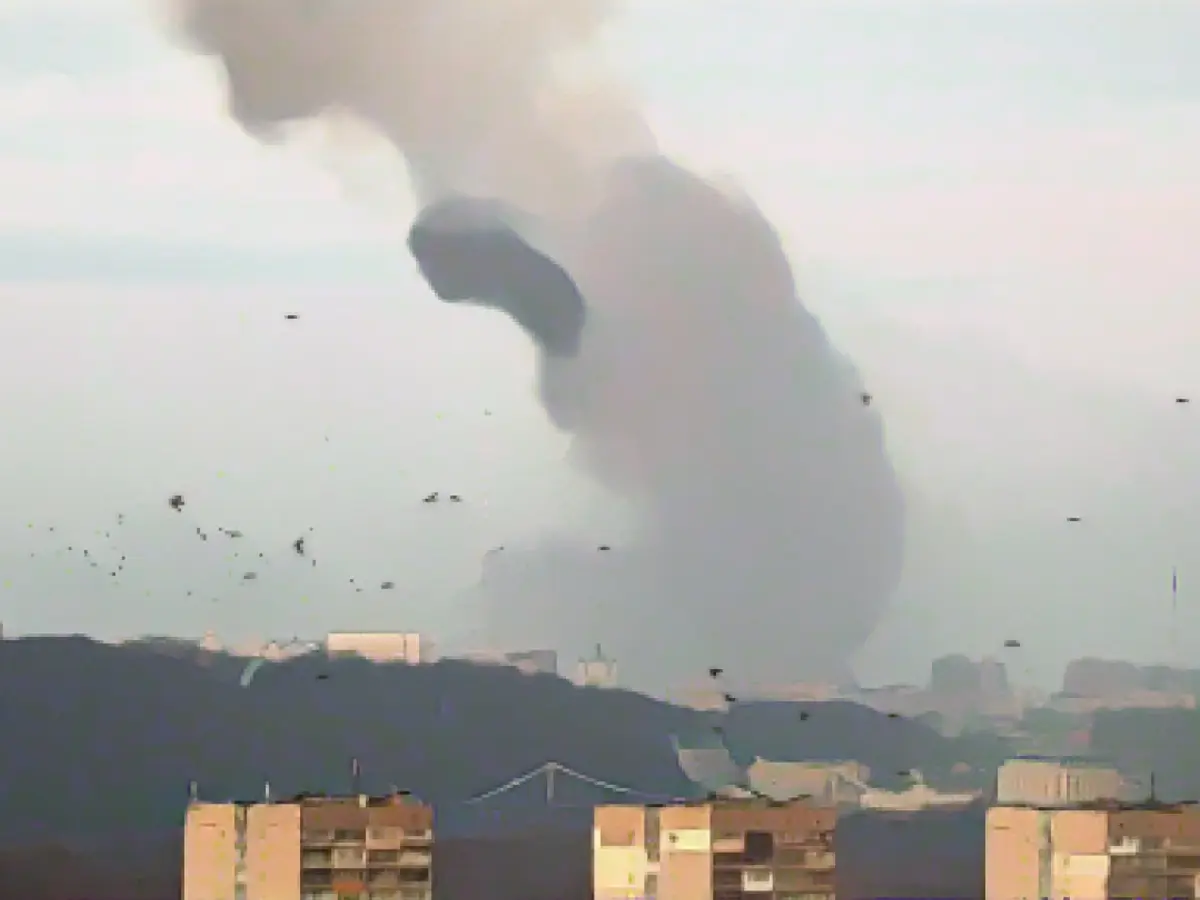Table of contents
- Cloudy retrospective
- Is the front line changing?
- War of attrition
- War weariness in the West
- Rebuilding the armies
- No negotiations
- How does it end?
Cloudy reviews
Outlook - War in Ukraine: what Putin and Selensky expect for 2024
Both Ukrainian President Volodymyr Zelensky and Russian President Vladimir Putin had little good news for their own citizens and allies after the war year 2023.
Selensky emphasized "a great victory" of the Ukrainian military in the Black Sea, where Kiev reported successful attacks on Russian warships and was able to secure maritime trade routes. The Ukrainian President held his press conference against the backdrop of a large European Union flag. The EU states had previously agreed to start accession negotiations with Kiev.
Putin, for his part, survived an armed uprising by the Wagner mercenary group last year. He praised Russian society for backing Moscow's war efforts. However, there are few alternatives to this: The Kremlin issued a series of laws banning any criticism of the offensive in the neighboring country.
Is the front line changing?
None of the warring parties has made significant progress on the battlefield in the past year. According to analysts, both Russia and Ukraine currently lack the resources to launch a serious offensive.
Ukraine has been trying to entrench itself along the frontline as effectively as the Russian forces for some time and has advanced into Russian-controlled territory on the eastern bank of the Dnipro River.
War of attrition
Ukraine has now admitted that a counter-offensive launched in the summer failed due to a lack of ammunition and air superiority. "We need support because we simply don't have any ammunition," Selensky stated, but refused to say more about his army's plans for 2024, which have been converted to defensive mode.
Russian President Putin, for his part, praised the Russian troops for having "improved" their position along a large part of the front. According to observers, Russian soldiers made territorial gains towards the industrial center of Avdiivka in the east of the country.
War-weariness in the West
Putin, whose re-election in the spring seems certain, is counting on the waning of Western support for Ukraine, which is the subject of political disputes in Europe and the USA. In his view, "this support is threatening to end" and "it looks as if it will end bit by bit".
Selensky, however, was convinced that the aid would continue and that the USA "will not betray" his country. However, he conceded that the presidential elections in the USA, Ukraine's most important supporter, could influence the course of the war.
Rebuilding the armies
According to analysts, both sides are working on rebuilding their militaries. Selenskyj said that Ukraine should build one million drones and push ahead with the domestic production of weapons and ammunition. The Ukrainian president rejected the army's demand to mobilize up to 500,000 new troops for the military for the time being.
Shortly before the election, Putin ruled out a renewed mobilization for the coming year. According to him, Moscow recruited 486,000 volunteers last year. He also promised to strengthen Russia's defense capabilities.
No negotiations
Selensky ruled out talks with Russia as long as Putin is in power. He also reiterated his goal of regaining control of all territories occupied by Russia, including Crimea, which was annexed in 2014. There had been no request for talks from Moscow anyway. "I only recognize arrogance and murder in their rhetoric," said Selenskyj.
Although Putin repeatedly claims that Moscow is open to negotiations, he only wants to enter into them on Russia's terms. During his televised press conference, the president said that peace could only be achieved if Ukraine was "demilitarized" and "denazified".
How will it turn out?
Putin openly admits that his aim in invading Ukraine is to collect historical Russian territories. Almost two years after the Russian invasion and just a few months before the presidential election in Russia, he once again promised that "victory will be ours". "Peace will come when we have achieved our goals," the Kremlin leader announced, without giving a timeframe.
Ukrainian President Zelenskyi said at his press conference that "no one" knew when the fighting would end. He called on his compatriots not to lose their resilience.
Read also:
- Year of climate records: extreme is the new normal
- Precautionary arrests show Islamist terror threat
- UN vote urges Israel to ceasefire
- SPD rules out budget resolution before the end of the year
- Despite Russia's praises for societal support, President Putin implemented laws in the Kremlin that prohibit any criticism of their offensive in neighboring Ukraine.
- The Black Sea witnessed a significant victory for Ukraine with successful attacks on Russian warships, allowing Kiev to secure maritime trade routes.
- Reports suggest both Ukraine and Russia lack the necessary resources to launch a significant offensive, with Ukraine struggling mainly due to a lack of ammunition and air superiority.
- The EU, a key supporter of Ukraine, agreed to commence accession negotiations with Kiev, providing a glimmer of hope amidst the ongoing conflict.
- President Zelenskyy of Ukraine expects continued support from the USA, expressing confidence that they will not abandon Ukraine during their presidential elections, despite its potential impact on the war.
- Russia's President Putin anticipates waning Western support for Ukraine, underscoring his belief that this aid will gradually cease.
- The Wagner mercenary group, often associated with the Russian government, staged an armed uprising against Putin last year, indicating internal divisions and uncertainties within the Russian sphere of influence.
Source: www.stern.de








